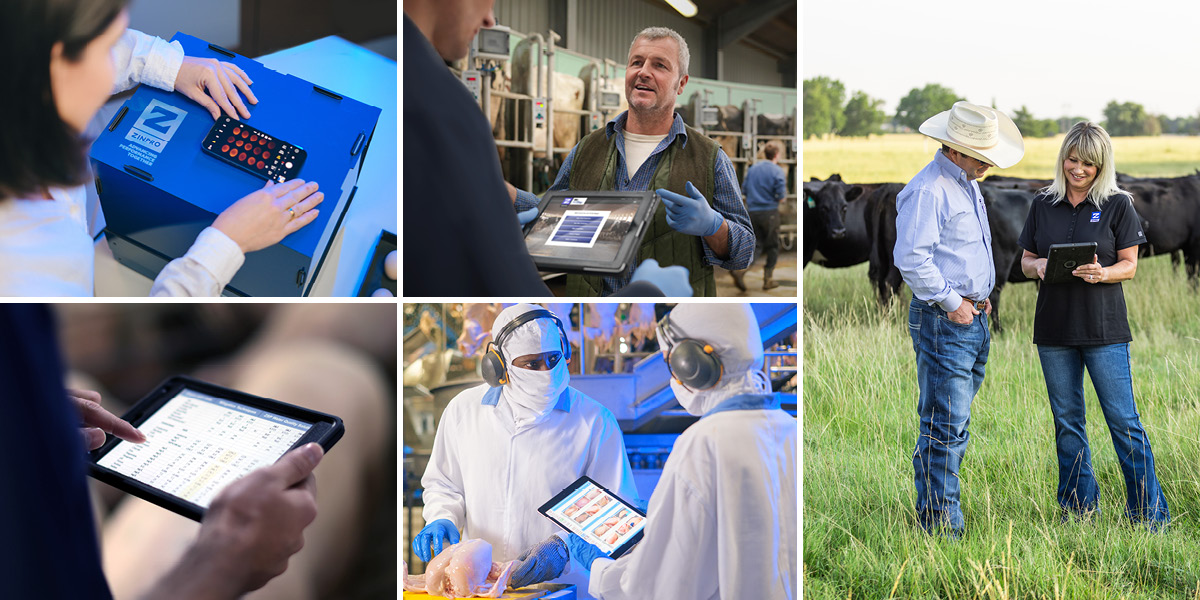Sustainable farming is inseparable from advancing animal performance and productivity. By optimizing how we utilize limited resources, we can build a more sustainable future. Nutritional innovations play a vital role in driving this progress.
Advancing Performance for a More Sustainable World
Over the last decades we have made tremendous progress in the performance and productivity of farm animals, due to better genetics, management and nutrition. In broilers and fattening pigs, this has led to increased average daily gain and higher average body weight. The performance of modern layers has advanced to more eggs per year, for a longer period of time, with the ability to reach 500 eggs in 100 week cycles.
In the United States, the average annual milk production per cow has doubled within the last 40 years and is now approximately six times greater than 100 years ago (USDA NASS, 2023). In fish and crustacean farming, better genetics, better feeding and applying ‘best-aquaculture practices’ have increased production to a great extent already, with more potential to grow in the coming decades.
Increasing Animal Performance is the Right Place to Start
Despite these achievements, global population growth and resource scarcity demand faster progress. Measuring and lowering greenhouse gas emissions from farm to plate is a difficult task, but increasing productivity and performance seem to be the right place to start. By increasing productivity, the same output can be achieved with fewer animals and resources (such as feed and energy), lowering greenhouse gas emissions like methane and nitrous oxide, which are significant in livestock farming.
For instance, higher production efficiency of dairy cows leads to increased profitability of the farm and decreased carbon footprint per kilogram of milk produced (as shown by Džermeikaitė et al (2024) among others). In layers, higher long-term egg production is also very much intertwined with increased sustainability. Selecting hens that maintain good condition at older ages allows for higher egg quality and a reduced environmental footprint for egg production.
Better Nutrition to Maximize Long-Term Performance
Nutrition directly influences production outcomes. Emerging nutritional products, data and technologies are transforming the ability to enhance productivity and reduce the environmental impact of animal protein production. Key strategies to make the next leaps in body weight growth, carcass weight, milk yield, egg production and weight include:
- Optimized feeding practices: This includes providing a customized, nutrient rich diet throughout all production phases. It is also pivotal to ensure that the animals can digest and mobilize the nutrients well. This comes down to careful ingredient selection and formulation.
- Early feeding practices: Getting animals off to a good start is critical for their lifetime performance. Optimizing early feeding practices for calves may ensure long-term milk production and solid growth levels up to breeding. Balanced piglet diets support daily weight gain and can positively influence the weaning process, while early feeding practices for chicks and pullets have been shown to increase body weight and egg production among other benefits.
Better Mineral Utilization Improves Performance
Feeding animals is about more than meeting basic needs, it’s about building resilience and optimizing productivity. At Zinpro, decades of research into trace minerals have demonstrated their transformative impact on performance, profitability and sustainability.
For example:
- Beef: 4.1 kg (9 lbs) heavier. 5.4 kg (11.9 lbs) increase in carcass weight
- Dairy: 4% more milk and better pregnancy rates (+5.5%).
- Calves: Better feed efficiency (+13.6%), double body weight by 60 days of age using a standard milk replacer.
- Crustaceans: +8% in growth rate
- Broilers: Improved carcass yield by 0.9% and improved breast meat yield by 0.9%
Data and Tools to Support Sustainability Journey
If we can do more with less, we produce in a more sustainable way and improve economics. However, progress depends on accurate measurement and actionable insights. That’s why Zinpro provides tools per species to help farmers trace issues back to management or nutrition practices to maintain performance and health.
- For broilers: The Zinpro® Perfect Carcass Tool® evaluates carcass defects in poultry, helping farmers trace issues back to nutrition and management practices, reducing waste and improving health.
- For layers: The Zinpro® BlueBox™ assesses eggshell quality to improve hatchability, supporting healthier and stronger chicks and reducing production losses.
- For dairy: The Zinpro® FirstStep® Dairy Hoof Health & Management Program provides dairy producers with objective metrics to assess nutrition, health and management changes over time.
- For beef: The Zinpro® Step Up® Lameness Management Program for Beef Cattle provides a systematic approach to identify and manage beef cattle lameness.
- For swine: The Zinpro® Feet First® Program helps identify and prevent lameness in swine herds, allowing operations to focus on the wellness of the animals and improve the efficiency of pork production.
By leveraging these tools, farmers can improve feeding practices, enhance animal performance and achieve measurable gains in sustainability. This way we can further unlock the genetic potential of our animals and reduce the environmental impact for each kilogram of milk, meat and eggs.

